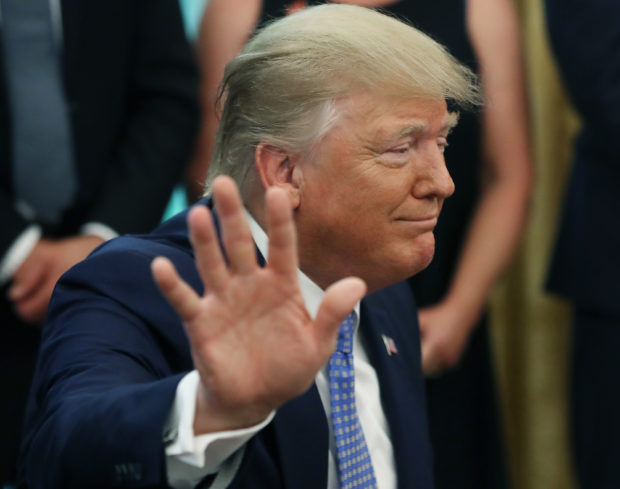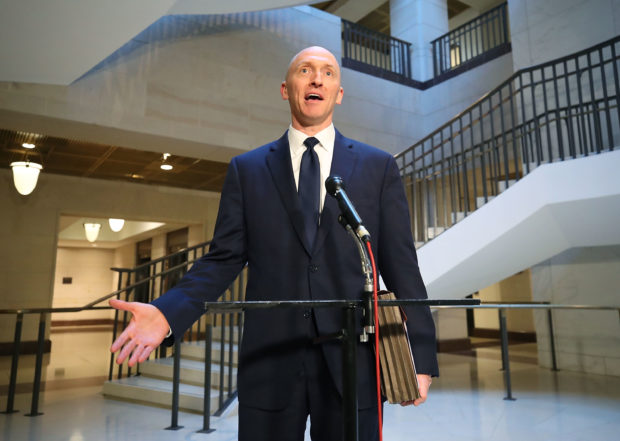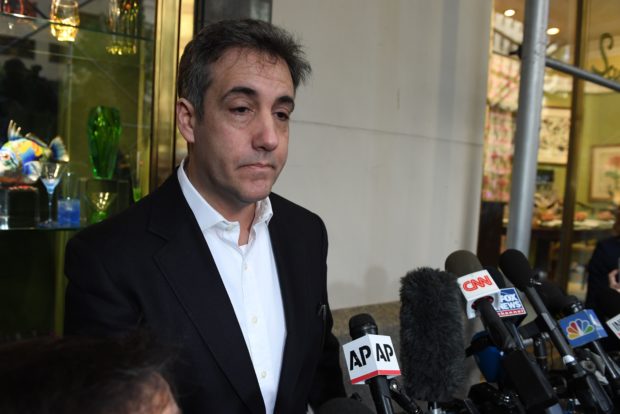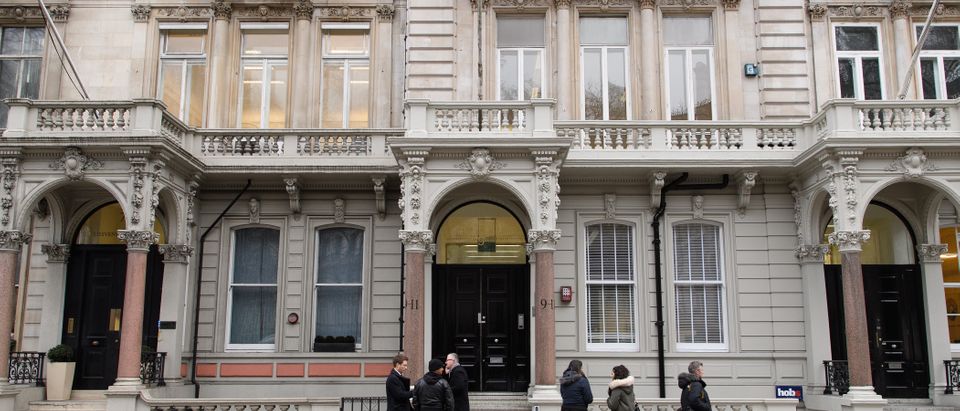- The Steele dossier will be front-and-center on Monday when the Justice Department’s inspector general releases a long-awaited report on the FBI’s handling of the salacious document.
- Released nearly three years ago, Steele’s dossier served as a roadmap of sorts of Democrats who believed that President Trump and his campaign were in bed with Russia.
- But developments in the Russia investigation steadily chipped away at Steele’s dossier, especially the parts that allege that Trump and his campaign aides conspired directly with the Kremlin.
The Steele dossier is likely to come under intense scrutiny on Monday, when the Justice Department inspector general releases a report of the FBI’s surveillance of former Trump campaign adviser Carter Page.
Michael Horowitz, the inspector general, is expected to detail the FBI’s relationship with Christopher Steele, the former British spy who authored the dossier. The bureau relied on unverified information from Steele in applications for Foreign Intelligence Surveillance Act (FISA) warrants against Page.
Comprised of 17 memos dated from June 2016 to December 2016, Steele’s Democrat-funded dossier has hardly stood the test of time since it was published on Jan. 10, 2017.
The special counsel’s report debunked several of Steele’s most troubling allegations, and cast doubt on many others. But some of the dossier’s most ardent defenders, including Fusion GPS, the firm that hired Steele, are defending the document. Fusion’s co-founders, Glenn Simpson and Peter Fritsch, wrote in a book released last week that the dossier’s broad outlines of Russian interferences in the 2016 election were “prescient.” (RELATED: Mueller Report Debunks Several Dossier Claims)
While Steele’s dossier did accurately describe some of Russia’s activities, his Trump-specific allegations were further off the mark.
Here is an analysis of 23 of the dossier’s factual claims, in chronological order. Some are quoted directly from the dossier while others are paraphrased.
June 20, 2016
“The Russian authorities had been cultivating and supporting US Republican presidential candidate, Donald Trump for at least 5 years.”
- Unsubstantiated. Trump has adamantly denied receiving any help from the Russian government, and no evidence emerged from the special counsel’s investigation that the Kremlin has cultivated the Republican.
“The Kremlin had been feeding Trump and his team valuable intelligence on his opponents, including Democratic presidential candidate Hillary Clinton, for several years.”
- Unsubstantiated. No evidence has emerged either through media reports or the special counsel’s investigation to support the claim. Donald Trump Jr. and other Trump associates did meet with a group of Russians in June 2016 after an intermediary said that they wanted to provide dirt on Clinton. But according to virtually all of the meeting participants, the Russians did not provide information on Clinton and instead used the opportunity to lobby against U.S. sanctions against Russia.
“The Kremlin’s cultivation operation on Trump had also comprised offering him various lucrative real estate development deals in Russia.”
- Unsubstantiated with an element of truth. Michael Cohen, a longtime lawyer for Trump, did discuss real estate projects in Russia with an associate, Felix Sater, but there has been no evidence produced so far that those were part of a Kremlin “cultivation operation” of Trump.
Russians sought to “exploit Trump’s personal obsessions and sexual perversions to obtain suitable ‘kompromot’ [compromising material] on him.” Kremlin operatives filmed Trump in compromising positions in a Moscow hotel.
- Unsubstantiated. In a press conference just after BuzzFeed published the dossier on Jan. 10, Trump called the sex allegations “phony stuff.”
- Steele has reportedly told associates he is only “fifty-fifty” certain that the incident occurred. Fusion GPS founder Glenn Simpson has reportedly told associates that he considered Steele’s alleged source for the claim to be a “big talker.”
- The special counsel’s report did not settle this aspect of the dossier. It did refer to a text message that a Georgian-American businessman sent to Michael Cohen on Oct. 30, 2016 that referred to rumors about tapes involving Trump. Cohen told Congress on Feb. 27, well after he flipped on Trump, that he investigated the allegations of a Trump sex tape but did not believe one existed.

President Donald Trump (Mark Wilson/Getty Images)
“The Clinton dossier was controlled exclusively by chief Kremlin spokesman, Dmitry Peskov, who was responsible for compiling/handling it on the explicit instructions of Putin himself.”
- Unsubstantiated. While a U.S. intelligence assessment has said that Putin was directly involved in the campaign meddling — a claim that the Kremlin denies — no evidence has been produced showing that Peskov personally handled the project. Some Russia observers have questioned why Putin’s chief spokesman would be in charge of the collusion operation.
July 19-30
“There was a well-developed conspiracy of co-operation between [the Trump campaign] and the Russian leadership.”
- Debunked. The special counsel’s report said that prosecutors were unable to establish that the Trump campaign conspired with Russian officials. The report also said that there was no evidence that Trump associates acted as Russian agents.
“This was managed on the Trump side by the Republican candidate’s campaign manager, Paul Manafort, who was using foreign policy advisor, Carter Page, and others as intermediaries.”
- Debunked. Both Manafort and Page have said they do not know each other. Page was never accused of a crime in the special counsel’s probe. Manafort was convicted on finance-related charges in the special counsel’s investigation but never accused of orchestrating a conspiracy with Russia.
“The Russian regime had been behind the recent leak of embarrassing e-mail messages, emanating from the [DNC], to the WikiLeaks platform.”
- Likely True. Prosecutors working on the special counsel’s investigation indicted more than two dozen Russian nationals on charges that they conspired to hack and release DNC emails. None of the Russian nationals have appeared in the U.S. to face trial, though it is widely accepted that they were involved in the hacking operation.
“The operation had been conducted with the full knowledge and support of Trump and senior members of the campaign team.”
- Debunked. The special counsel’s report said there was no evidence that Trump or members of his campaign were involved in the hack-and-dump operation. FBI interview notes show that Trump officials were pleased with the release of Democrats’ emails, but that they were scrambling to figure out when information would be released rather than taking an active part in releasing the emails.
“Russian diplomatic staff in key cities like New York, Washington and Miami were using the emigre ‘pension’ distribution system as cover.”
- Unsubstantiated. The special counsel’s report did not address this allegation.
July 19
Igor Sechin, a crony of Putin’s and the CEO of Russian oil giant Rosneft, met secretly with Carter Page during a trip that the Trump campaign adviser made to Moscow in early July. Sechin allegedly brought up the possibility of removing Ukraine-related sanctions against Russia, which Page allegedly “reacted positively” to. Page also met secretly with senior Kremlin official Igor Divyekin.
- Unsubstantiated. Page did visit Moscow during the time that the dossier claims. But the visit, where Page gave a speech at the New Economic School, had been revealed in the press by the time Steele made this allegation. Page has denied ever meeting Sechin and Divyekin. He did meet with the head of Rosneft’s investor releations during his July 2016 to Moscow.

Carter Page, former foreign policy adviser for the Trump campaign. (Mark Wilson/Getty Images)
“An intelligence exchange had been running between [the Trump team and Kremlin] for at least 8 years.”
- Unsubstantiated. No evidence has been produced to support this claim, and the Trump campaign has denied it.
“Putin’s priority requirement” in the information exchange with Trump world was to obtain information about Russian oligarchs and their families. Trump and his associates supplied the information.
- Unsubstantiated. Neither the Russian government nor Trumpworld has addressed the claim. The special counsel’s investigation did not identify any information being passed from Trump associates to the Kremlin.
“The Kremlin had more intel on Clinton and her campaign.”
- True. At the time the memo was written, Russian operatives had already hacked into the email account of Clinton campaign chairman John Podesta. WikiLeaks would begin publishing those hacked emails in October. U.S. intelligence officials have said that there is ample evidence pointing to Russia being behind the hacks.
Aug. 10
Carter Page “conceived and promoted” the idea of releasing hacked DNC emails through WikiLeaks.
- Debunked. The special counsel’s report provided no evidence that any Trump associates were involved in hacking DNC emails, or directing their release through WikiLeaks.
Sept. 14
“The Kremlin had further ‘kompromat’ on candidate Clinton and had been considering releasing this via ‘plausibly deniable’ channels after the Duma (legislative) elections were out of the way in mid-September.”
- True. WikiLeaks would begin releasing Podesta emails a month after Steele wrote this claim in the dossier.
Russian diplomat Mikhail Kalugin was withdrawn from Washington at short notice because of his “heavy involvement in the US presidential election operation.” Kalugin took part in the veterans’ pension “ruse” to help fund the active measures campaign.
- Partially True. Kalugin was called back from Washington, D.C. at the time that the dossier claims he was. But he denied to McClatchy that he was involved in paying any operatives to influence the election. McClatchy also reported that the FBI was investigating whether Russia’s intelligence agency, the FSB, used a pension system for former Russian soldiers to disguise payments for hackers who targeted the campaign. The status of that investigation is unclear.
Sept. 14
Trump participated in sex parties in St. Petersburg and paid bribes to make the stories “disappear.” Azerbaijani-Russian billionaire Aras Agalarov would know the details.
- Unsubstantiated. Trump does know Agalarov. They partnered on a deal to host the 2013 Miss Universe pageant in Russia. The Agalarov family was also involved in the June 9, 2016 Trump Tower meeting. It was set up at the request of Agalarov’s son, Emin.
Oct. 20
“Clandestine meeting between…Trump’s lawyer Michael Cohen and Kremlin representatives in August 2016.” The meeting took place in Prague.
- Debunked. The special counsel’s report cited Cohen’s statement that he has ever visited Prague, suggesting that investigators concurred with the former Trump lawyer’s denial. Cohen vehemently denied all of the Steele dossier’s allegations against him during closed-door congressional interviews in February and March 2019, months after he entered a guilty plea with federal prosecutors. (RELATED: Michael Cohen Puts Dagger In The Heart Of Steele Dossier Allegations)
A Kremlin-controlled cultural exchange group called Rossotrudnichestvo “was being used as cover for this relationship and its office in Prague may well have been used to host the Cohen meeting/s.”
- Unsubstantiated. In addition to Cohen’s denial that he was in Prague, there has been no evidence produced that Rossotrudnichestvo was involved in helping the Trump campaign.

Michael Cohen reports to jail Monday, May 6, 2019 (TIMOTHY A. CLARY/AFP/Getty Images)
“Konstantin Kosachev (head of the Foreign Relations Committee) is an important figure in the Trump campaign-Kremlin liaison operation.”
- Unsubstantiated. Kosachev has denied involvement.
Mid-October
Rosneft CEO Igor Sechin offered Carter Page a 19 percent brokerage stake on a deal involving the Russian oil giant in return for getting sanctions lifted if Trump was elected president. Page expressed interest in the proposal.
- Unsubstantiated. Page has denied ever meeting Sechin or being offered a brokerage deal for Rosneft.
Dec. 13
“A company called XBT/Webzilla and its affiliates had been using botnets and porn traffic to trasmit viruses, plant bugs, steal data and conduct ‘altering operations’ against the Democratic party leadership. Entities linked to one Aleksej Gubarev were involved and he and another expert, both recruited under duress by the FSB, Seva Kapsugovich, were significant players in this operation.”
- Unsubstantiated. Gubarev is suing BuzzFeed and Steele for publishing the dossier containing this allegation. BuzzFeed later apologized to Gubarev and redacted his name from the dossier.
- McClatchy has also reported that Kapsugovich appears to have been in prison when the dossier claims he was involved in the hacking scheme.
- Steele acknowledged in April in a court filing in London, where he is being sued by Gubarev, that the Dec. 13 memo had not been verified. (RELATED: Ex-Spy Who Wrote Trump Dossier Says Some Claims In It Are Unverified)
All content created by the Daily Caller News Foundation, an independent and nonpartisan newswire service, is available without charge to any legitimate news publisher that can provide a large audience. All republished articles must include our logo, our reporter’s byline and their DCNF affiliation. For any questions about our guidelines or partnering with us, please contact licensing@dailycallernewsfoundation.org.


